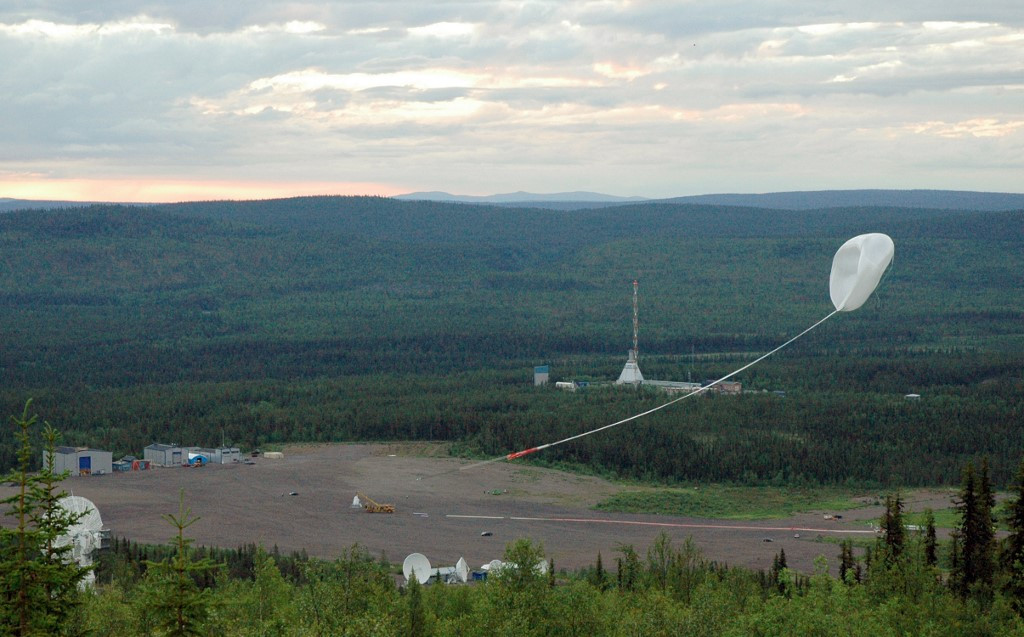Popular Reads
Top Results
Can't find what you're looking for?
View all search resultsPopular Reads
Top Results
Can't find what you're looking for?
View all search resultsControversial test flight aimed at cooling the planet cancelled
A team of Harvard scientists had been planning to launch a high-altitude balloon from the Esrange Space Station in the Swedish town of Kiruna, to test whether it could in future carry equipment to release solar radiation-reflecting particles into the Earth's atmosphere.
Change text size
Gift Premium Articles
to Anyone
 A giant helium balloon rises slowly from the ground early July 7, 2011 at the Esrange space centre near Kiruna. Swedish scientists were forced to cut short a cutting-edge project and ground a giant helium balloon carrying an X-ray telescope shortly after it launched due to a leak, a space centre said today. The PoGOLite (Polarised Gamma-ray Observer), a two-tonne telescope dangling from an enormous balloon filled with one million cubic metres of helium was launched at 1:57 am (2357 GMT Wednesday) from Esrange and was brought back to earth shortly after 7:00 am. (AFP/Swedish Space Corporation)
A giant helium balloon rises slowly from the ground early July 7, 2011 at the Esrange space centre near Kiruna. Swedish scientists were forced to cut short a cutting-edge project and ground a giant helium balloon carrying an X-ray telescope shortly after it launched due to a leak, a space centre said today. The PoGOLite (Polarised Gamma-ray Observer), a two-tonne telescope dangling from an enormous balloon filled with one million cubic metres of helium was launched at 1:57 am (2357 GMT Wednesday) from Esrange and was brought back to earth shortly after 7:00 am. (AFP/Swedish Space Corporation)
U
S and European scientists have called off a controversial balloon test flight that was to take place in Sweden's far north in June, part of a disputed solar geoengineering experiment to artificially cool the planet.
A team of Harvard scientists had been planning to launch a high-altitude balloon from the Esrange Space Station in the Swedish town of Kiruna, to test whether it could in future carry equipment to release solar radiation-reflecting particles into the Earth's atmosphere.
The project has been dubbed SCoPEx, short for "Stratospheric Controlled Perturbation Experiment".
Mimicking the effect of volcanic eruptions, the project's supporters say the technology should be studied to see if it could become a method of combatting global warming.
But the project, like geoengineering itself, has raised concerns among both scientists and environmentalists who say the technology is dangerous and risky.
Critics fear the injection of particles into the stratosphere could damage the ozone layer and disrupt ecosystems.
"The scientific community is divided regarding geoengineering," the state-owned Swedish Space Corporation (SSC), which operates Esrange, said in a statement issued Wednesday.
Following dialogues with experts, stakeholders and Harvard University, "SSC has decided not to conduct the technical test flight planned for this summer."
A special committee set up by Harvard to study the societal and ethical aspects of the project had also called for the test flight to be postponed in order to review the implications for Sweden's indigenous Sami people and Sweden in general.
The committee recommended "that societal engagement should occur in Sweden before any SCoPEx research is conducted in the country."
"This will likely postpone the platform launch until 2022," it said.










